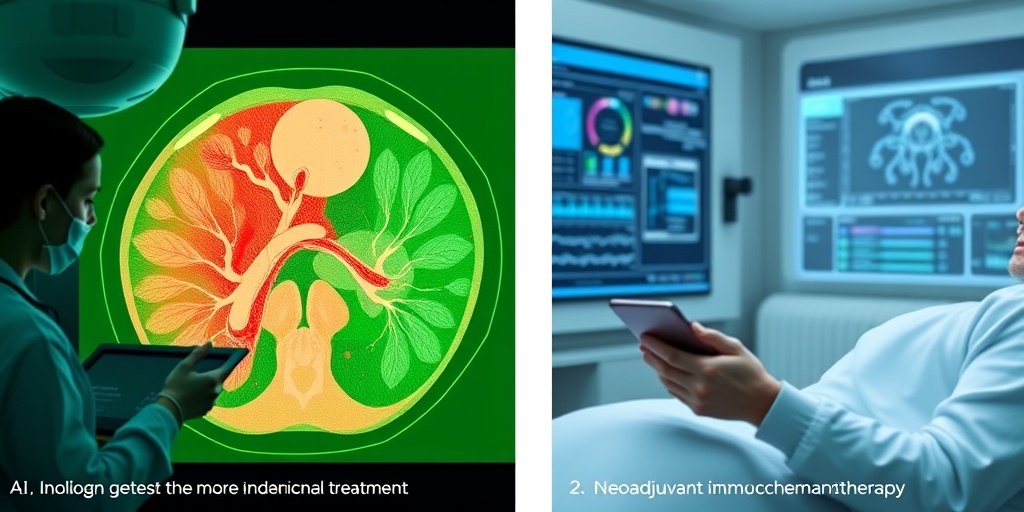⚡ Quick Summary
This study highlights the transformative role of artificial intelligence (AI) in medical imaging, particularly in enhancing the effectiveness of neoadjuvant immunochemotherapy (nICT) for patients with esophageal squamous cell carcinoma (ESCC). By utilizing advanced AI techniques, the research demonstrates improved predictive capabilities for treatment responses, paving the way for more personalized patient care.
🔍 Key Details
- 📊 Focus: Neoadjuvant immunochemotherapy in ESCC
- 🧩 Technology: AI-driven medical imaging and radiomics
- ⚙️ Methodology: Voxel-level feature extraction and deep learning
- 🏆 Outcomes: Enhanced predictive accuracy for treatment responses
🔑 Key Takeaways
- 🔬 Neoadjuvant immunochemotherapy (nICT) shows promise in improving survival rates for ESCC patients.
- 🤖 AI in medical imaging can extract complex features from CT images that traditional methods may overlook.
- 📈 AI models provide more accurate predictions of patient responses to nICT.
- 🌟 Future advancements in AI are expected to enhance clinical applicability and generalizability.
- 🩺 AI supports all stages of perioperative management, from patient identification to treatment adjustments.
- 💡 The study emphasizes the need for precise predictive tools in clinical decision-making.
- 🌍 Research conducted by a team of experts in the field, published in J Immunother Cancer.

📚 Background
Esophageal squamous cell carcinoma (ESCC) is a challenging malignancy, often requiring innovative treatment approaches to improve patient outcomes. Neoadjuvant immunochemotherapy (nICT) has emerged as a promising strategy, yet the variability in patient responses underscores the necessity for more reliable predictive tools. Traditional biomarkers have limitations, prompting the exploration of artificial intelligence (AI) as a potential solution.
🗒️ Study
The study investigates the integration of AI in medical imaging to enhance the precision of nICT for ESCC patients. By leveraging radiomics and deep learning techniques, researchers aimed to extract detailed features from clinical CT images, which can reveal biological heterogeneity that standard assessments might miss. This innovative approach seeks to refine predictive capabilities and ultimately improve treatment outcomes.
📈 Results
The findings indicate that AI models, utilizing voxel-level feature maps, significantly enhance the accuracy of predicting patient responses to nICT. This advancement is crucial, as it allows for a more tailored approach to treatment, ensuring that patients receive the most effective therapies based on their unique biological profiles.
🌍 Impact and Implications
The implications of this research are profound. By harnessing the power of AI in medical imaging, healthcare providers can identify high-risk patients more effectively, monitor therapeutic responses dynamically, and adjust treatments on an individual basis. This comprehensive approach not only advances the field of precision medicine but also holds the potential to significantly improve survival outcomes for patients with ESCC.
🔮 Conclusion
This study underscores the transformative potential of AI in enhancing neoadjuvant immunochemotherapy for esophageal squamous cell carcinoma. As AI technologies continue to evolve, they promise to revolutionize patient care by providing more accurate predictions and personalized treatment strategies. The future of oncology looks promising with the integration of AI, and further research in this area is highly encouraged!
💬 Your comments
What are your thoughts on the integration of AI in cancer treatment? We would love to hear your insights! 💬 Join the conversation in the comments below or connect with us on social media:
Artificial intelligence in medical imaging empowers precision neoadjuvant immunochemotherapy in esophageal squamous cell carcinoma.
Abstract
Neoadjuvant immunochemotherapy (nICT) has demonstrated significant potential in improving pathological response rates and survival outcomes for patients with locally advanced esophageal squamous cell carcinoma (ESCC). However, substantial interindividual variability in therapeutic outcomes highlights the urgent need for more precise predictive tools to guide clinical decision-making. Traditional biomarkers remain limited in both predictive performance and clinical feasibility. In recent years, the application of artificial intelligence (AI) in medical imaging has expanded rapidly. By incorporating voxel-level feature maps, the combination of radiomics and deep learning enables the extraction of rich textural, morphological, and microstructural features, while autonomously learning high-level abstract representations from clinical CT images, thereby revealing biological heterogeneity that is often imperceptible to conventional assessments. Leveraging these high-dimensional representations, AI models can provide more accurate predictions of nICT response. Future advancements in foundation models, multimodal integration, and dynamic temporal modeling are expected to further enhance the generalizability and clinical applicability of AI. AI-powered medical imaging is poised to support all stages of perioperative management in ESCC, playing a pivotal role in high-risk patient identification, dynamic monitoring of therapeutic response, and individualized treatment adjustment, thereby comprehensively advancing precision nICT.
Author: [‘Fu J’, ‘Huang X’, ‘Fang M’, ‘Feng X’, ‘Zhang XY’, ‘Xie X’, ‘Zheng Z’, ‘Dong D’]
Journal: J Immunother Cancer
Citation: Fu J, et al. Artificial intelligence in medical imaging empowers precision neoadjuvant immunochemotherapy in esophageal squamous cell carcinoma. Artificial intelligence in medical imaging empowers precision neoadjuvant immunochemotherapy in esophageal squamous cell carcinoma. 2025; 13:(unknown pages). doi: 10.1136/jitc-2025-012468